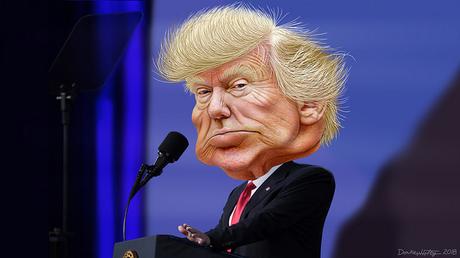
(This caricature of Donald Trump is by
DonkeyHotey.)
It is obvious to any thinking person that Trump's new tax cuts did little to nothing for the middle class and low-wage workers, while rewarding the rich and corporations with massive tax cuts. But that is not the only way Trump has acted to help corporations. His effort to deregulate corporations and Wall Street is more insidious, and has largely flown under the radar. This deregulation is important though, as it constitutes nothing less than a war on American workers.
The following is just a tiny part of an excellent article by Celine McNicholas, Heidi Shierholz, and Marni von Wilpert for the
Economic Policy Institute (and I urge you to read the whole article for an in-depth discussion of all the points below):
On December 14, 2017, President Trump held a press conference to take credit for the “most far-reaching regulatory reform in history,” claiming his administration has been responsible for more than 1,500 cancelled or delayed regulatory actions.1 He is expected to tout this number again at his upcoming State of the Union address to Congress. While the specific figure Trump cited at the press conference has been called into question, there is no disputing that Trump and congressional Republicans have engaged in an unprecedented attack on regulations over the last year, rolling back rules that were intended to protect workers, consumers, and public health.
The Economic Policy Institute’s Perkins Project on Worker Rights and Wages has been tracking Trump and Congress’s decimation of federal labor standards through deregulation since January 2017.2 Regulations play an essential role in protecting workers—ensuring safe workplaces and fair pay and protecting workers’ rights to organize and join a union so they can bargain collectively with their employers. But not only do regulations provide essential protections; research shows that federal regulations in fact provide an overall net benefit to the economy—contrary to what its opponents would have people believe. . . .
The facts about regulation
1. Regulations put laws into action, protecting America’s workers
2. Regulations not only provide essential protections, but their economic benefits generally outweigh their costs
a. Federal regulations currently provide a net benefit to society of over $100 billion per year
b. The ratio of benefits to costs is about 7 to 1
c. Regulations have a modestly positive or neutral effect on employment
d. Mass layoffs are not caused by regulations, but lack of regulations can lead to job loss
Trump’s year of deregulation
Deregulation casualty #1: Workers’ health and safety
a. Rolling back a rule that required employers to keep accurate records of workplace injuries and illnesses
b. Delaying a rule requiring employers submit injury and illness records electronically to OSHA
c. Delaying a rule protecting workers from exposure to harmful silica dust
d. Rolling back protections for workers exposed to beryllium
e. Proposing to weaken the inspection rule for metal and nonmetal mines
f. Considering a proposal to increase poultry line speeds, endangering workers
g.Proposing to weaken protections for farmworkers
Deregulation casualty #2: Workers’ wages
a. Proposing to make it legal for employers to take workers’ hard-earned tips
b. Taking money out of workers’ pockets by weakening the overtime rule
Deregulation casualty #3: Workers’ savings
a. Rolling back rules that made it easier for workers to save for retirement
b. Delaying a rule providing protections for retirement savers
Deregulation casualty #4: Workers’ safety nets
Rolling back a rule ensuring that unemployment workers can access earned benefits
Deregulation casualty #5: Pay equity
a. Putting the EEO-1 pay data rule on hold
b. Proposing to roll back an SEC rule that requires disclosure of CEO-to-employee pay ratios
Deregulation casualty #6: Workers’ rights to organize and join a union
a. Rolling back a transparency rule that would allow workers to know when their employer has hired outside anti-union consultants during a union election
b. Rolling back rules to modify and streamline union elections
Deregulation casualty #7: Consequences for employers who violate workers’ rights
Rolling back the Fair Pay and Safe Workplaces rule
Conclusion
Regulations establish the rules of the game and assure important protections for working people. Corporations and wealthy special interests have demonstrated that—if there’s nothing stopping them—they will do what they can to squeeze out more profits for themselves, even if it means jeopardizing workers’ health and safety and retirement funds. The Great Recession is proof that it is dangerous to assume that corporations and Wall Street will police themselves. American workers deserve a fair system—with rules that serve their interests as opposed to deregulating to rig the system so that corporate interests can rake in ever-larger profits at the expense of workers. The Trump administration and congressional Republicans have spent an enormous amount of time and political capital in their first year in control doing exactly that—by painting regulations as the “problem.” It is time to end this deception and return to defending the rules that protect workers, consumers, and public health.
 (This caricature of Donald Trump is by DonkeyHotey.)
(This caricature of Donald Trump is by DonkeyHotey.)
